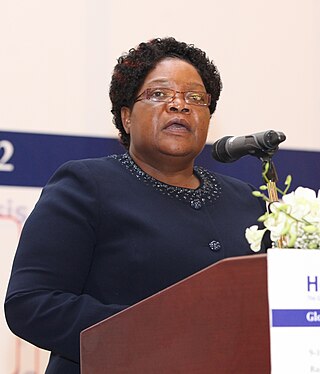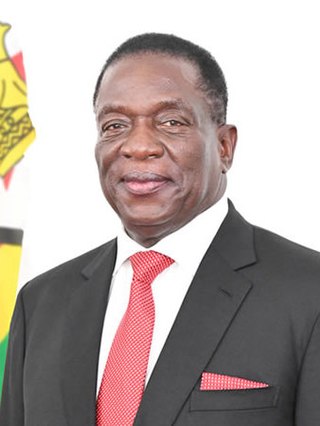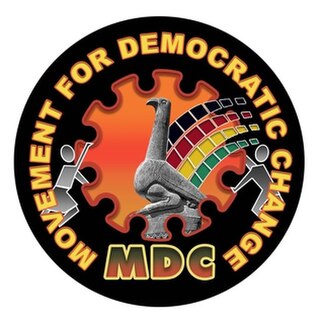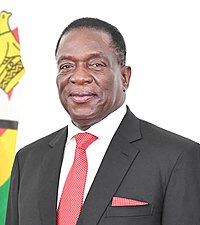
The Zimbabwe African National Union – Patriotic Front (ZANU–PF) is a political organisation which has been the ruling party of Zimbabwe since independence in 1980. The party was led for many years under Robert Mugabe, first as prime minister with the Zimbabwe African National Union (ZANU) and then as president from 1987 after the merger with the Zimbabwe African People's Union (ZAPU) and retaining the name ZANU–PF, until 2017, when he was removed as leader.

Joice Runaida Mujuru, also known by her nom-de-guerre Teurai Ropa Nhongo, is a Zimbabwean revolutionary and politician who served as Vice-President of Zimbabwe from 2004 to 2014. Previously she had served as a government minister. She also served as Vice-President of ZANU–PF. She was married to Solomon Mujuru until his death in 2011 and was long considered a potential successor to President Robert Mugabe, but in 2014 she was denounced for allegedly plotting against Mugabe. As a result of the accusations against her, Mujuru lost both her post as Vice-President and her position in the party leadership. She was expelled from the party a few months later, after which she formed the new Zimbabwe People First party.

Emmerson Dambudzo Mnangagwa is a Zimbabwean revolutionary and politician who has served as President of Zimbabwe since 24 November 2017. A member of ZANU–PF and a longtime ally of former President Robert Mugabe, he held a series of cabinet portfolios and was Mugabe's Vice President until November 2017, when he was dismissed before coming to power in a coup d'état. He secured his first full term as president in the disputed 2018 general election.
Articles related to Zimbabwe include:

Nelson Chamisa is a Zimbabwean politician and the current President of the Citizens Coalition For Change. He served as Member of the House of Assembly of Zimbabwe for Kuwadzana East, Harare. Chamisa was the MDC Alliance's candidate for president in the 2018 general election, having previously been the leader of the party's youth assembly. He has served as the former chairperson of national youth for the same party as well as the Secretary for Information and Publicity for the opposition party Movement for Democratic Change (MDC). In 2003, at the age of 25, Chamisa became the youngest Member of Parliament.
Sydney Tigere Sekeramayi is a Zimbabwean politician who served in the government of Zimbabwe as Minister of Defence between 2013 and 2017. He has been a minister in the Cabinet since independence in 1980, serving as Minister of Defence from 2001 to 2009 and Minister of State Security from 2009 to 2013.
Patrick Antony Chinamasa is a Zimbabwean politician who served in the government of Zimbabwe as the minister of various cabinet ministries. Previously he served as the Minister of Finance and Investment Promotion and the Minister of Justice, Legal and Parliamentary Affairs.

Ignatius Morgen Chiminya Chombo is a Zimbabwean politician who was Finance Minister of Zimbabwe in 2017. Previously he has served in the Cabinet of Zimbabwe as Minister of Home Affairs from 2015 to 2017, Minister of Local Government, Public Works and Urban Development from 2000 to 2015.
Webster Kotiwani Shamu is a Zimbabwean politician and former Minister of Mashonaland West Provincial Affairs fired by President Emmerson Mnangagwa on 21 May 2018. He previously served as Minister of Information and Publicity, and Minister of State for Policy Implementation. He is a member of parliament representing the Chegutu constituency. The Cabinet of Zimbabwe was later dissolved on 27 November 2017.

Phelekezela Mphoko is a Zimbabwean politician, diplomat, businessman and former military commander who served as Second Vice-President of Zimbabwe from 2014 until 2017, as well as Zimbabwe's ambassador to Russia, Botswana and South Africa. Legally, Mphoko was the acting President of Zimbabwe from 21–24 November 2017, however, as he was not in the country at the time, official standing on this is unclear. Mphoko's term as vice-president was ended by President Emmerson Mnangagwa following the dissolution of the cabinet on 27 November 2017.

The 7th Parliament of Zimbabwe was a meeting of the Zimbabwean Parliament, composed of the Senate and the House of Assembly. It met in Harare over five sessions from 25 August 2008 to 27 June 2013. Its membership was set by the disputed 2008 Zimbabwean general election, which resulted in a ZANU–PF majority in the Senate and Movement for Democratic Change – Tsvangirai control of the House of Assembly. Political negotiations resulted in the 2009 Government of National Unity, a coalition government composed of ZANU–PF, the MDC–T, and the MDC–M.

The Movement for Democratic Change – Tsvangirai (MDC–T) is a centre-left political party and was the main opposition party in the House of Assembly of Zimbabwe ahead of the 2018 elections. After the split of the original Movement for Democratic Change in 2005, the MDC–T remained the major opposition faction, while a smaller faction, the Movement for Democratic Change – Ncube, or MDC–N, was led by Welshman Ncube.

General elections were held in Zimbabwe on 30 July 2018 to elect the President and members of both houses of Parliament. Held eight months after the 2017 coup d'état, the election was the first since independence in which former President Robert Mugabe was not a candidate.

In November 2017, Zimbabwean President Robert Mugabe was removed as president and party leader of ZANU-PF, replaced by Emmerson Mnangagwa.
Generation 40 (G40) was a faction of the Zimbabwe African National Union – Patriotic Front (ZANU–PF). The G40 was an informal group of ZANU–PF politicians working on generation change by replacing the older officials of the party. The group promoted itself as the younger, savvy, and well educated ZANU–PF members. It was said to be led by Jonathan Moyo and ZANU–PF political commissar, Saviour Kasukuwere but fronted by Grace Mugabe, the former First Lady of Zimbabwe.
The Movement for Democratic Change Alliance was an electoral coalition of seven political parties formed to contest Zimbabwe's 2018 general election. After the 2018 election, a dispute arose over the use of the name MDC Alliance leading the MDC Alliance leader Nelson Chamisa to found the Citizens Coalition for Change.
The following lists events from the year 2018 in Zimbabwe.

On 23 June 2018, a grenade exploded at White City Stadium in Bulawayo, Zimbabwe. The blast occurred at a ZANU–PF campaign rally, just after President Emmerson Mnangagwa had finished giving a speech. It was described as an assassination attempt against Mnangagwa, who was unharmed. The bombing resulted in at least 49 injured, including Vice-Presidents Constantino Chiwenga and Kembo Mohadi, and other high-ranking government officials. Two security agents later died of their injuries.




















